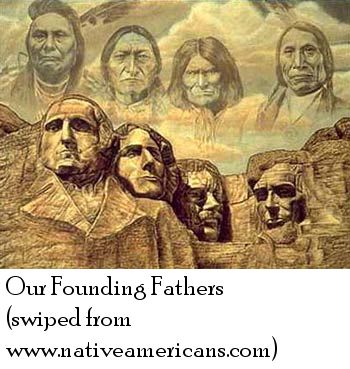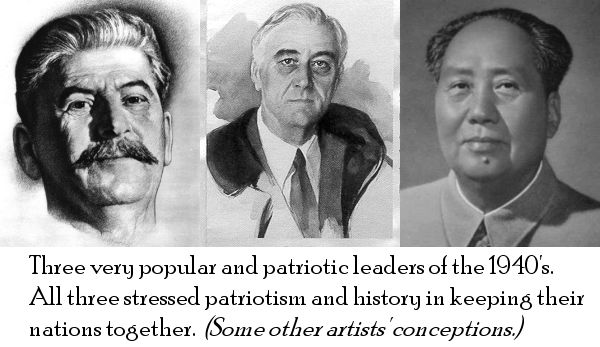History: Online Rantings
History and Patriotism
Let me start out by saying I love my country. I live in the United States of America, where I have the law of the land to protect my rights to believe as I choose, speak my mind, or to be treated fairly in a criminal court. I have the right to own property and the established precedent that government should not deprive me of it without due process. I think all that is just great. The USA is a land of plenty, where I live comfortably and have a generally good time.
That's not to say the place is perfect. It ain't. This can be traced to the fact that people are in charge and that people make mistakes. Plenty of mistakes have happened in the USA, just like everywhere else in the world. It's wonderful that these mistakes haven't resulted in the wholesale slavery of the nation to some ideal of the superstate or anything like that, so I consider the USA a lucky nation, indeed, in that respect.
But...
 I'm not going to let my love of country blind me to the mistakes my country has made. I mean, even my declarations of patriotism above are kind of reserved, when you examine them. I know I may have rights to free religion, but I also know my ancestors were driven out of the USA and had to seek religious freedom in Northern Mexico. I may have rights to free speech, but I've experienced firsthand corporate disapproval of what I may have to say from time to time, and those guys play hardball when they want someone to be quiet. Just because we have rights in the Constitution doesn't mean we're unscathed in practice by bigots, criminals, or incompetents who persecute in full defiance of whatever spirit our Foundin' Fathers must have had in drafting The Bill of Rights.
I'm not going to let my love of country blind me to the mistakes my country has made. I mean, even my declarations of patriotism above are kind of reserved, when you examine them. I know I may have rights to free religion, but I also know my ancestors were driven out of the USA and had to seek religious freedom in Northern Mexico. I may have rights to free speech, but I've experienced firsthand corporate disapproval of what I may have to say from time to time, and those guys play hardball when they want someone to be quiet. Just because we have rights in the Constitution doesn't mean we're unscathed in practice by bigots, criminals, or incompetents who persecute in full defiance of whatever spirit our Foundin' Fathers must have had in drafting The Bill of Rights.
Of course, who exactly were our Foundin' Fathers is a matter of debate to some, and an article of national faith to others. America's got a great deal of mythology built up around the leaders of the Revolutionary period. Some of it is harmless, but other myths cloud the truth in order to serve a darker purpose.
Take, for example, Thanksgiving. Since I took an image from www.nativeamericans.com, I'll go ahead and link back to their article about Thanksgiving. They're not bitter at all in their account. They present the facts of the matter and point out what the people at the Plymouth Rock settlement would and would not have eaten. They mention the first Thanksgiving holiday was set by Abraham Lincoln in 1863, and then re-set by Franklin D. Roosevelt in 1939.
Innocent enough on the surface, but I'm skeptical about their motives in calling attention to this holiday of thanks for how great things are. Both presidents were deep in political crisis in those years. Both presidents had a history of wanting to expand the powers of the executive branch of the government at the expense of individualism and individual rights. Both presidents during their tenure in office suspended one of America's most fundamental rights, the writ of habeas corpus (protection from unjust imprisonment), and did so in the name of protecting national security.
 Lincoln's suspension of habeas corpus allowed the imprisonment of those who criticized the war and shut down newspapers deemed hostile or antiwar. Chief Justice Taney argued the Constitution only allowed the legislative branch to suspend that right. I checked the Constitution, specifically Article I where Taney said to look, and there it is in section 9 of that article: "The privilege of the Writ of Habeas Corpus shall not be suspended, unless when in Cases of Rebellion or Invasion the public Safety may require it." It's the Congress' responsibility to do that, not the President's. When the Supreme Court ordered Lincoln to bring prisoners arrested without reason to them, Lincoln refused.
Lincoln's suspension of habeas corpus allowed the imprisonment of those who criticized the war and shut down newspapers deemed hostile or antiwar. Chief Justice Taney argued the Constitution only allowed the legislative branch to suspend that right. I checked the Constitution, specifically Article I where Taney said to look, and there it is in section 9 of that article: "The privilege of the Writ of Habeas Corpus shall not be suspended, unless when in Cases of Rebellion or Invasion the public Safety may require it." It's the Congress' responsibility to do that, not the President's. When the Supreme Court ordered Lincoln to bring prisoners arrested without reason to them, Lincoln refused.
This presents a problem. Popular American sentiment idolizes Abraham Lincoln, but this is just one instance of how he violated fundamental Constitutional rights in his term of office. Did the end justify his means? I don't think so. I certainly don't think his reputation is deserved. He had some tough decisions before him, and I feel he made terrible choices when he decided to snub the law of the land to pursue his prosecution of the Civil War.
Franklin Roosevelt faced some hard times in America when he sat as president, and, like Lincoln, engaged in some strong-handed policies to do what he thought necessary to beat back first the Depression, then the Axis powers in World War Two. He, like Lincoln, suspended habeas corpus in time of war, this time for American citizens who were descended from Japanese immigrants. I am more disturbed by FDR's case because he began the glorification of Lincoln and other mythological figures and symbols from American history to justify his policies. Critics of FDR (and I count myself among them) decry his Socialist policies and his end-runs around Congressional and Supreme Court checks on his powers and how he trapped himself in patriotic bunting to get away with it. FDR brought our nation a Pledge of Alliegance and a national anthem during a time when he did not want people to question his authority or actions. He played with the symbol of Thanksgiving to keep up his patriotic show. The Japanese attack on Pearl Harbor allowed him to use the cover of war to carry on even further down his authoritarian path. It was such a godsend to his efforts, one can actually find serious discussion and research about whether or not he knew about it, but allowed it to happen anyway to further his ends.
Now, when I think of Thanksgiving, I think of how the USA got manipulated into celebrating a holiday in order to subjugate our individual wills to the will of the state. Maybe I'm overreacting, but maybe I'm not.
The trouble is, the history of the USA is no longer the truth about the USA. It's part truth, part national, approved mythology. Samuel Johnson said, "Patriotism is the last refuge of a scoundrel." I feel part of a historian's duty is to dig back in the past and expose scoundrels who thought to make good by dressing themselves up in notions of the Fatherland, Mother Russia, the Yamato Race, and, yes, The American Founding Fathers. If we won't allow other nations in history to cook up a convenient past, we shouldn't, either.

This next statement might really rile up some folks, but I've got a right to free speech, and I'm going to say it. All the flag-waving in the wake of the 11 September 2001 attacks on the Pentagon and World Trade Center has distracted our eyes from abrogation of a variety of rights, including that of habeas corpus. Again, it is a president, and not a sitting Congress suspending the right. I'll quote Timothy Lynch, director of the Cato Institute's Project on Criminal Justice:
".... The Bush administration has now asserted that (a) citizens can be taken into custody as enemy combatants; (b) that, beyond such battlefield detainees, citizens can also be taken off the streets of any American town; and (c) that civilian courts cannot intervene to inquire into the legality of such arrests and detentions. When these propositions are taken together as a whole, the implications are very disturbing.
"The bottom line is that President Bush and Attorney General Ashcroft are attempting to suspend the 'Great Writ' of habeas corpus, which allows Americans to get into a court of law to challenge the legality of their arrest and to have their liberty restored if the court agrees that the arrest was unlawful. Without judicial review, the police can arrest people without warrants and jail people without trials.
"The controversial 'military order' that Bush issued last November has, in effect, now been extended to American citizens--and the writ of habeas corpus is now under assault. President Bush seems to believe that his commander-in-chief power gives him the authority to ignore every other part of the Constitution when he deems it necessary. The president is profoundly mistaken about that -- and the judiciary should resist this power grab."
I'm proud to be an American, but I don't know for sure that I'm still entirely free as the government would like me to believe I am. If I am blindly patriotic, then I am very free as long as I don't also fall into a group of suspect individuals: patriotism provided no refuge for dead-loyal Nisei. If, however, I look at the history of my country, I can't be blind to repetitions of that history in my present day, and I have to question if I am as free and have as much expectation my Constitutional rights will be respected as I did prior to this current outburst of patriotic zeal.